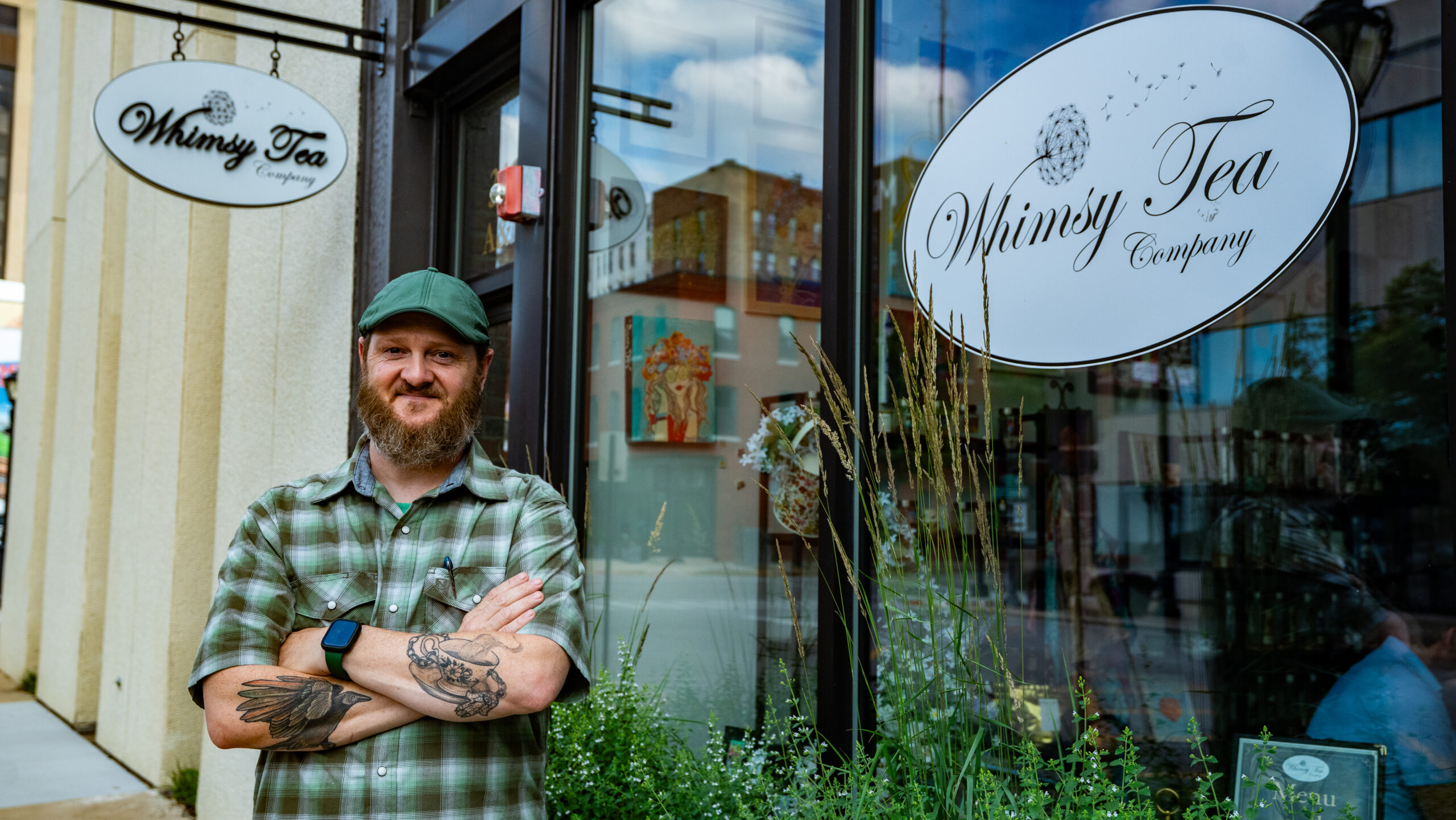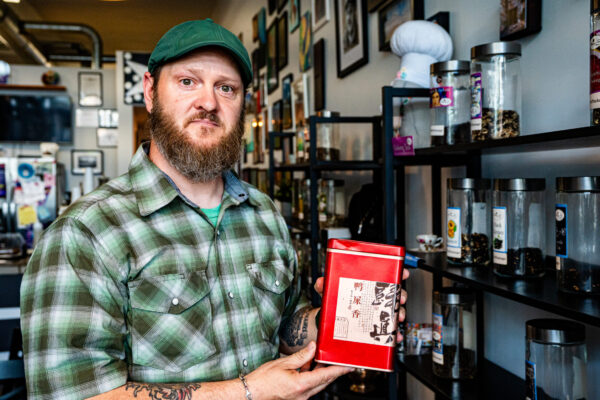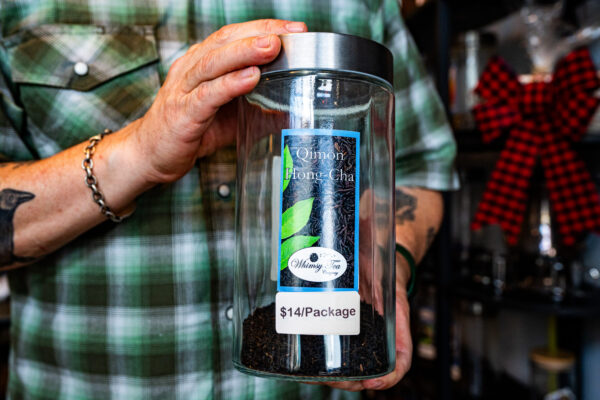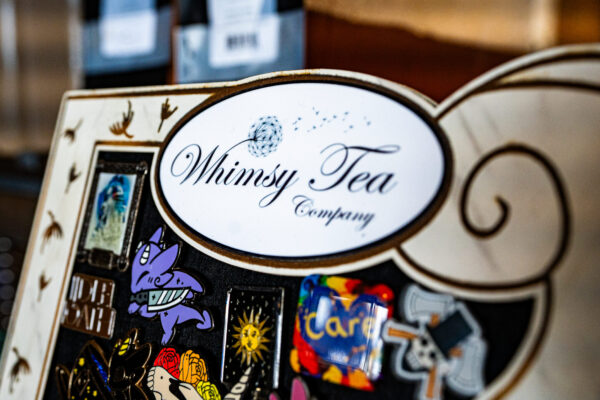Retailers like Gordan Davis, founder of Whimsy Tea in Springfield, Illinois, enrich our economy and strengthen our communities, even during the uncertainty of increased tariff expenses. To better understand how Whimsy Tea is dealing with the escalation of existing tariffs, we sat down for a conversation with Gordon.
Every cup of freshly brewed tea tells a global story at Whimsy Tea in Springfield, Illinois, starting with the store’s concept and running through that very last sip. Opened in 2019, it is a place where Whimsy Tea founder Gordon Davis and his family create unique tea blends for their discerning customers.
“We create the teas. We conceive of what those flavor profiles are going to be, what tea blends are going to go in there, what herbs, what flowers, all of that,” said Gordon. “I think that the spirit of community and that wanting to make things better is at the core of our being.”
The shelves of Whimsy Tea are filled with hundreds of tea blends from more a hundred different countries around the globe. The tea business is predominantly reliant on international trade because the overwhelming majority of tea is exported to the United States. And so, these days, as Gordon pours his tea blends for his customers, he is facing challenges unlike any other for his business: the specter of rising tariffs.
“It’s deeply unsettling. You don’t know what the tariff rate is going to be from day to day,” said Gordon, who noted that many essential ingredients sold at his store, most notably his high-quality black teas, come from China because of that nation’s unique climate and geographical characteristics.
We sat down with Gordon Davis to better understand his concerns about what rising tariff costs will mean for his business.
IRMA: Tell me how the tariffs are currently impacting you.
GORDON: The current situation is utter unpredictability. You don’t know what the tariffs are from day to day. You don’t know if they’re going to change. You don’t know if you order a product, and by the time it comes in, whether the tariff rates are going to be the same for what you’ve planned for or not.
IRMA: How did you react when you first starting to hear that the President would raise tariffs on imports?
GORDON: We saw in 2024 the rhetoric about tariffs and so we started getting nervous then. In November of 2024, we went through and ordered as much tea ahead of time as we could. That way we had a stockpile. But it’s not a huge stockpile. We had some stock, so that when the tariffs came and when they got sorted out, we’d at least be slightly better positioned, instead of getting hammered by tariffs out of nowhere.
IRMA: Why does so much of your product come from outside the United States?
GORDON: Our teas, and the ingredients for our teas, come from 149 different countries. The majority of it does come from China. The plain fact of the matter is you can’t get black tea here. It doesn’t grow here except for a small island off the coast of one of the Carolinas. There are maybe 12 countries where we can get that (black tea) from. Each tea is unique. It has a specific flavor profile. It has a certain astringency level. If we want good, quality black tea, which we do for all of our black tea blends, we want to start with a very good Hong Cha (black Tea). That is specifically a Chinese product. We also get a green tea from China that we use in a lot of our blends. It’s a flash dried Chinese green tea. The truth of the matter is that without China, America doesn’t have tea.
IRMA: Why is that?
GORDON: We don’t have the climate to grow tea. We don’t have the
elevation, and we don’t have the hydrology (movement and distribution of water). We also don’t have the wind, and all of these things go into actually getting tea or to grow the grains.
IRMA: What have you told your customers about what’s going on?
GORDON: We tell our customers that we understand that the tariffs are here. We are trying our best to keep our prices stable. We want to keep providing quality teas at an affordable price. That’s said, if they go up too high, we can’t just absorb that cost. We are a tiny, tiny business. There is no eating the tariffs here. We may have to look into sources of ingredients from other places. That said, the quality isn’t always there. The price isn’t always there, and the consistency isn’t always there. We’ve established relationships with vendors for over six years. If we have to drop them, because we just can’t afford to bring it (tea) into the country, you know that that’s going to hurt. It’s going to hurt our quality. It’s going to hurt our customers.
IRMA: So, as a business owner you have to be ready to adjust to change quickly?
GORDON: Our thoughts are always planning for the worst and hoping for the best. Over the past few years, we’ve learned that we have to be ready to pivot on a dime. We’ve got to pivot if the retail sales aren’t there. If we can’t, we’ll have to either limit our selection to what we can do consistently and reliably with our quality standards or potentially switch to just being a restaurant.
IRMA: So, what did you think when the Illinois Governor came to Whimsy Tea for a press conference about the tariffs and how they are impacting Illinois retailers?
GORDON: I’m glad to know that Illinois, whether they can do something to affect federal policies like tariffs or not, the powers that be, they’re listening. They’re getting our input. They’re getting our feedback. They know where we sit. That is incredibly heartening.
IRMA: And the Governor came to visit you directly?
GORDON: Yes, in April of 2025, the governor actually came to our tiny little tea shop in downtown Springfield. He was genuinely listening to us describe the struggles we’re going through and how tariffs affected us. I understand that the governor can’t change federal policy. Tariffs are set at the federal level, and the governor of Illinois can only affect the laws and state of Illinois. But at least he’s trying this. He came and he listened.
IRMA: What do you want to tell the politicians, congressional members and federal level politicians about how their decisions or how this global trade war is impacting small business?
GORDON: If I had the opportunity to address members of Congress in the House or the Senate, I’d like them to know that these (tariff) games are doing irreparable damage to small businesses. American retail doesn’t have a backup supplier of toys and games or tea, dresses, or anything like that, because all of our production has, over the last few decades, been shipped from overseas. Everything we get at some level, it’s touched by another company. Our compostable flatware comes from China because we’re trying to be environmentally friendly. The bags we pack the tea in, comes from China. We live in a world in which the economic ecosystem is so tightly intertwined. Extricating ourselves from that is going to cause a whole lot of pain and those outcomes are going to be long term for our economy.
IRMA: Do you think this tariff war is isolated to just small business?
GORDON: Sure, it’s the little guys. But let’s be honest, larger corporations, and larger retailers can absorb rising tariff costs a little bit more. They have a lot more flexibility. That said, a big corporation like Hasbro (toys) was saying that they’re only going to be able to import a third of the toys that that they previously planned for the holiday season. So, even the big corporations are hurting. The car companies are saying, ‘Hey, wait, these tariffs are going to raise the price of a new a new car, $20,000.’ That is going to put that car out of the reach of the people that it’s targeted to. These trickle-down effects are just going to keep rolling and rolling. The tariffs are the pebble that started down the hill, and they get covered in snow and end up creating an avalanche.
To learn more about Whimsy Tea: whimsyteacompany.com






